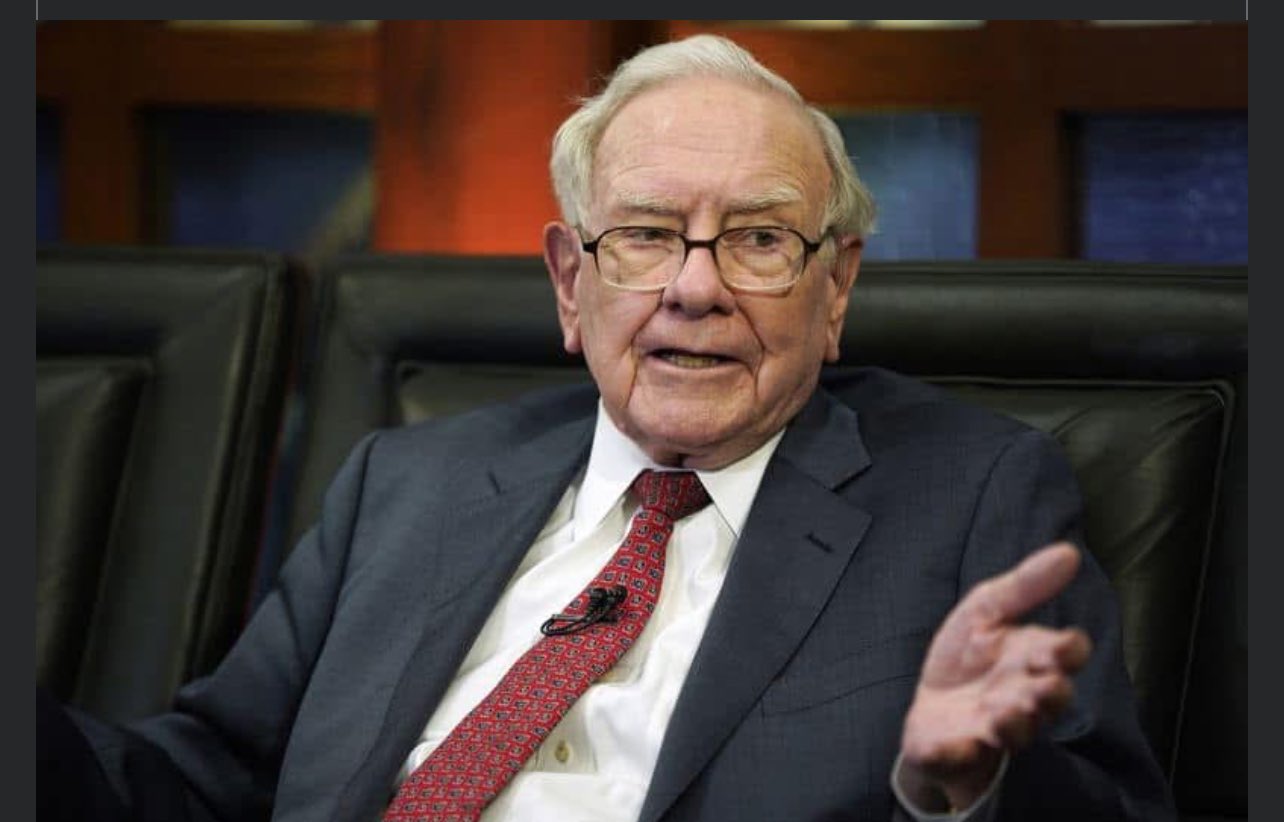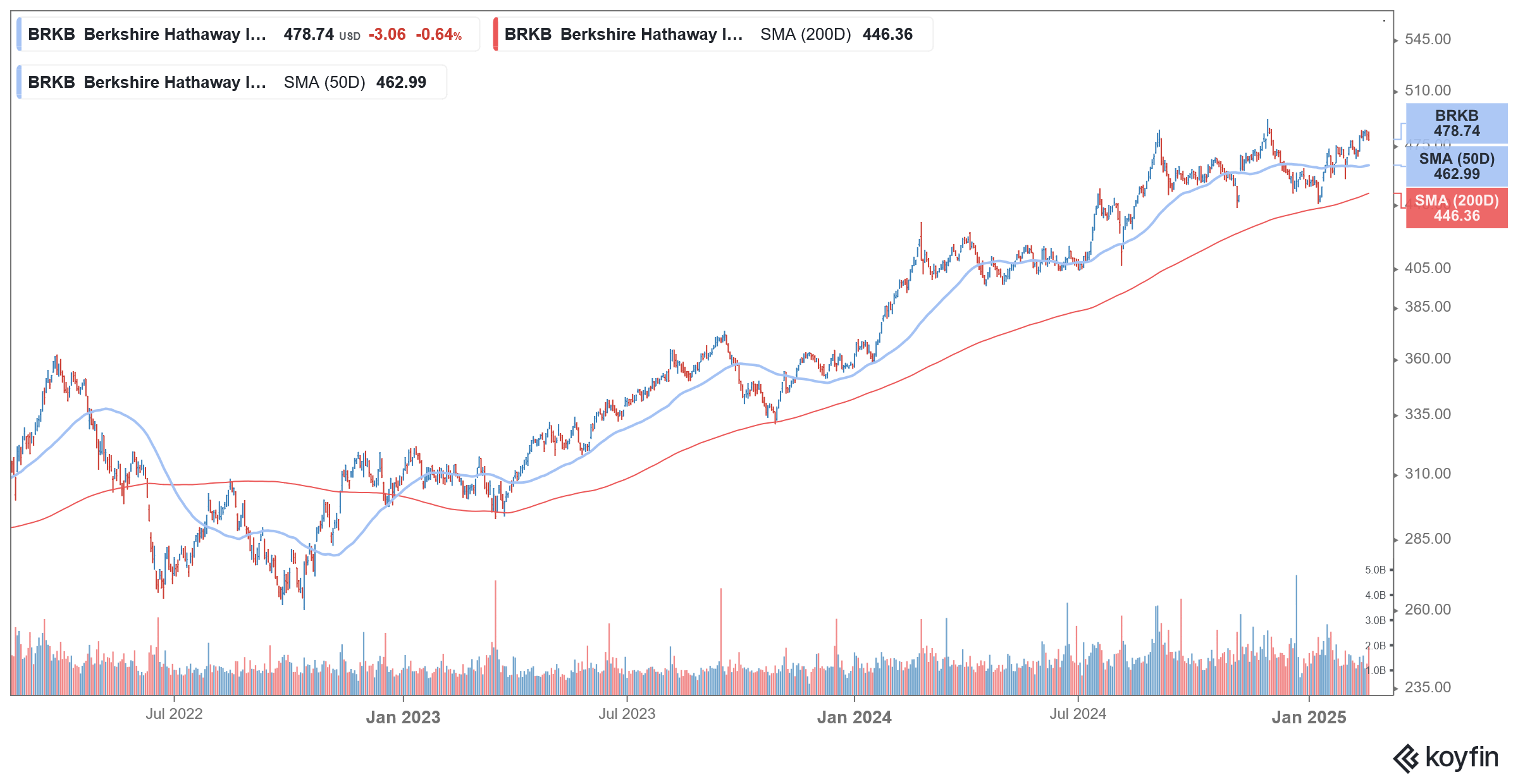
Berkshire Hathaway that’s led by the legendary value investor Warren Buffett released its annual report yesterday which showed that the conglomerate’s cash pile rose to a fresh record high of $334 billion at the end of 2024.
The rise in cash is hardly surprising and the company’s cash pile has been rising gradually over the last few quarters since Buffett has net sold shares for nine consecutive quarters. Last year the company sold $134 billion worth of shares as Buffett offloaded stakes in top holdings Apple and Bank of America.
Berkshire’s cash pile swelled to a record high in Q4
However, after selling Apple shares relentlessly for the last many quarters, Buffett did not sell any additional stake in the iPhone maker during the final quarter of the year. The company holds 300 million shares of Apple valued at over $73 billion which is almost a quarter of its total portfolio.
Notably, Berkshire trimmed its Apple shares by 13% in Q1 2024, which Buffett said was due to tax reasons. The company is sitting on a massive gain on its Apple investment and would stand to lose if capital gain taxes rise in the US as the federal government strives to cut the country’s burgeoning fiscal deficit.
Buffett sold more Bank of America shares in Q4
Meanwhile, Buffett continued to pare down its stake in Bank of America and sold 117,000 shares in Q4. The conglomerate still holds an 8.9% stake in America’s biggest bank valued at around $32 billion and it is its third biggest holding after Apple and American Express.
Historically, Buffett has tried to keep Berkshire’s stake in banks below 10% to avoid regulatory scrutiny. He however made an exception for Bank of America and took regulatory approval to hike the stake beyond 10%. Berkshire invested $5 billion in the company’s preferred shares in 2011 and gradually increased the stake. Buffett had also invested in Goldman Sachs during the 2008-2009 financial crisis even as he passed over struggling names like Lehman Brothers.
However, over the last couple of years, the nonagenarian has exited many financial names including Goldman Sachs, Wells Fargo, U.S. Bancorp, and JPMorgan Chase.
In Q4, Buffett sold over 70% of its stake in Citi as he trimmed the position in the bank for the first time. The company bought Citi shares in 2022 amid the turnaround under CEO Jane Fraser. Citi shares have appreciated significantly since then.
Berkshire also sold 18% of its stake in Capital One Financial. It also trimmed stake in Brazilian fintech company Nu Holdings continuing the selling spree from the previous quarter. Elsewhere, Berkshire trimmed stakes in Charter Communications, T-Mobile US, and Louisiana-Pacific.
Warren Buffett alluded to share sales in his annual letter
While Buffett did not specifically spell out the reason behind his relentless selling in this year’s annual letter, he did touch upon the issue. “Berkshire shareholders can rest assured that we will forever deploy a substantial majority of their money in equities – mostly American equities although many of these will have international operations of significance,” wrote Buffett in the widely-awaited letter.
“Berkshire will never prefer ownership of cash-equivalent assets over the ownership of good businesses, whether controlled or only partially owned,” added Buffett in the letter.
Buffett however hinted that he does not find market valuations attractive and said, “We are impartial in our choice of equity vehicles, investing in either variety based upon where we can best deploy your (and my family’s) savings.” The “Oracle of Omaha” added, “Often, nothing looks compelling; very infrequently we find ourselves knee-deep in opportunities.”
Buffett warns on growing fiscal deficit
Buffett also sounded an alarm over higher fiscal deficits and said, “Paper money can see its value evaporate if fiscal folly prevails. In some countries, this reckless practice has become habitual, and, in our country’s short history, the U.S. has come close to the edge.”
Notably, the US fiscal deficit hit a record high of $3.13 trillion in the fiscal year 2020. The surge was understandable as the economy needed support during the pandemic. The deficit came down to $2.77 trillion in the fiscal year 2021. It fell further to $1.38 trillion in the next fiscal year and while it was much below the previous year, it was significantly higher than in pre-pandemic times when the deficit was contained below $1 trillion. However, in the fiscal year 2024, the budget deficit increased to $1.8 trillion and looks set to rise higher this year considering it already stands at $838 billion in the first four months of the current fiscal year.
Powell has also cautioned on rising deficit
Fed chair Jerome Powell has also cautioned against rising deficit and in an interview with CBS 60 Minutes last year said, “The U.S. federal government is on an unsustainable fiscal path. And that just means that the debt is growing faster than the economy.”
He added, “I think the pandemic was a very special event, and it caused the government to really spend to ward off what looked like very severe downside risks. It’s probably time, or past time, to get back to an adult conversation among elected officials about getting the federal government back on a sustainable fiscal path.”
While Powell said that the Fed’s role is not to “judge” the fiscal policy, he warned, “we’re effectively — we’re borrowing from future generations. And every generation really should pay for the things that it, that it needs. It can cause the federal government to buy the things that it needs for it, but it really should pay for those things and not hand the bills to our children and grandchildren.”
More recently, Bridgewater Associates founder Ray Dalio also “alerted” governments and people about the rising deficit and said, “I want to help, you know, and so I feel like the doctor, and then I would say everybody, politically … if this doesn’t happen, and we have the equivalent of, you know, an economic heart attack, or a heart attack of the bond market, then you know who’s responsible, because it can happen.”
Buffett did not repurchase Berkshire shares in Q4
Meanwhile, for the second consecutive quarter, Buffett did not repurchase any Berkshire shares. The conglomerate spent over $50 billion repurchasing its shares between 2020 and 2021 and since then the buyback activity has been quite tepid before coming to a halt in Q3.
We might hear Buffett’s views on the share sales and buybacks during the annual day meeting set for early May. Until then, markets would keep guessing the reason behind the legendary value investors’ rising cash kitty.


Question & Answers (0)